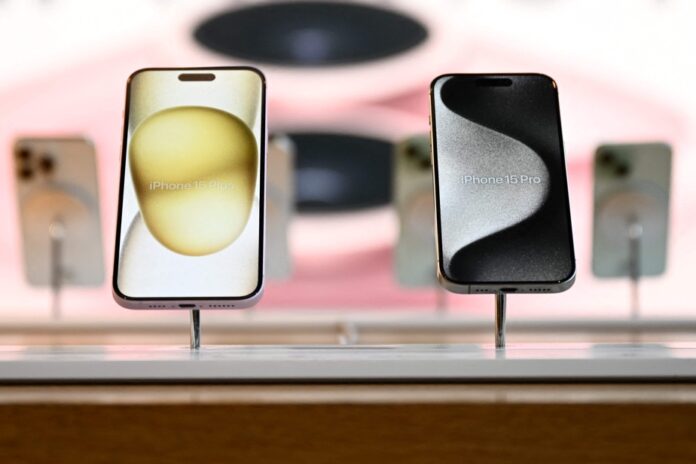No one is fooled, the four iPhone 15 models announced by Apple at the beginning of September do not revolutionize anything. But they offer some thoughtful little improvements, like a completely redesigned Mute button, simplified exchanges between phones and, of course, the arrival of USB-C. And they are powerful enough to leave the competition far behind.
We got our hands on two of the four models Apple launched this year, the iPhone 15 and its more expensive version, the iPhone 15 Pro. Let’s start with the first which, as has become tradition, takes up the main characteristics of last year’s iPhone 14 Pro. For $270 less, still.
Our iPhone 15 now has the Dynamic Island, this tablet-shaped window at the top of the screen which completes the display. Its first use, after a year of experience, is to easily jump between two applications, for example Waze and Books. By pressing firmly on this window, it stretches and displays additional commands, for example for music control.
Although the iPhone 15 has one less camera than the Pro version, it has a 2x optical zoom and the ability to take photos up to 48 megapixels, in JPEG and HEIC formats, no longer just in RAW as was the case last year. This 48-megapixel capability, which is not enabled by default, excites photo enthusiasts a lot, allowing you to zoom in on details with an impressive level of precision. For ordinary people, it must be admitted, it is a generally unnecessary luxury.
Another point common to the two iPhone 15s, facilitated by their use of the USB-C socket, they can now charge small devices, less than 4.5 watts. Perfect for recharging your headphones, even phones according to our tests, but not a tablet. It is even rather the latter, if it is capable, which will charge your iPhone 15.
Before moving on to the Pro model, a quick stop is required to test the power of these iPhones with Geekbench. As this calibration software recently released its sixth version, the previous comparison tests have unfortunately become obsolete. Unlike usual, we still included two of the most popular Android models, the Galaxy S23 Ultra and the Pixel 7 Pro.
For the photo, we compared the two iPhone 15s to their high-end predecessor, the iPhone 14 Pro Max. We also included the Pixel Pro 7, praised for its photo quality.
The Pixel Pro 7 was superior in only one area, low-light photos, where it compensated for darker corners well. Its front camera produced very bland selfies, unlike the three iPhones which were generous in color and detail.
Clear victory for the two iPhone 15s, here. They are especially remarkable for the details and the management of contrasts, with rich colors.
Let’s move on to the iPhone 15 Pro, equipped with the new A17 Pro chip which, as Geekbench 6 notes, is especially notable for its graphics processing. To the point where Apple promises that this phone will be able to handle big AAA games like Resident Evil Village, Assassin’s Creed Mirage and Death Stranding. We couldn’t verify these claims since these games are promised “later this year,” but it’s clear that the iPhone 15 Pro is a beast of speed for video processing, and handles switching between multiple apps like no other. open.
What is fun and easy to test, however, is replacing the good old silent switch with a versatile button, the “Action Button”. This is, in our opinion, the main discovery of the 2023 version. By default, when you press this button for two seconds, the phone enters Do Not Disturb mode. It can also open the camera, in five variations ranging from portrait to video to classic shooting. The button then serves as a trigger. This is our favorite use of this Action Button, which can also turn on a flashlight, start recording voice memos, display a magnifying glass and launch around twenty accessibility functions.
Whether because of the new iOS 17 operating system or a faulty unit, we found our iPhone 15 Pro to be unstable at times, finicky for example in an app like OneDrive.
The Dynamic Island is still compatible with too few applications. Apart from those designed by Apple, no additional commands are offered.
Managing content in Apple’s cloud computing, iCloud, remains a headache for us. Whether it’s music or photos, it’s hard to understand what is saved locally or found on all iOS devices.
iPhones remain for many the most advanced smartphones, and are certainly the most lucrative. Apple has therefore not shaken up its recipe, but has offered some nice little improvements with its version 15. Nothing to push an older iPhone owner to immediately change models, but surely enough to establish its dominance.















